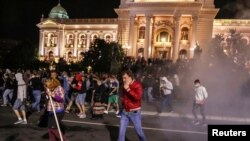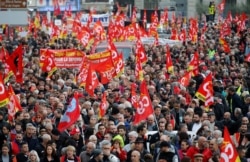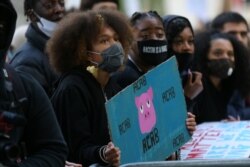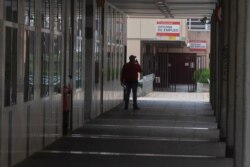As infection rates start rising in some European countries, the potential for civil unrest and political aftershocks is growing as patience wears thin, say analysts.
In the wake of violent clashes Tuesday in the Serbian capital — where thousands of protesters angry about the re-imposition of some lockdown measures fought running battles with baton-wielding riot police — governments across the continent are bracing for battles on their own streets.
Serbia went from one of the strictest lockdowns in Europe to a near complete reopening of the country at the beginning of May, but a surge in confirmed cases has prompted the reintroduction of a weekend curfew. Serbian President Aleksandar Vucic called the virus situation in Belgrade “alarming” and “critical,” with the city's hospitals nearing full capacity. The rioting in Belgrade saw both far-right and far-left protesters battling police.
Even before the pandemic, Europe was in the grip of rising political anger, and mainstream parties were rocked by populist stirrings that have been reshaping the continent’s politics. But the pandemic is making many on the continent angrier still, fueling protests, further polarizing politics and exposing long-simmering political and social tensions.
“In the early stages of the crisis, politics was suspended, and public opinion fell in behind the actions of national governments. Citizens were sent into internal exile in their own homes, many paralyzed with fear and uncertainty,” noted the European Council on Foreign Relations in a report last month.
But with nerves on edge, unemployment set to rise and economic hardship mounting, the mood in some major cities has been turning sour.
London, Paris, Brussels, and Stuttgart all have seen riots in recent weeks. Myriad causes have brought people out — from racial justice to anger at lockdown restrictions. Some have been sparked by general fury and frustration with no political demands expressed. In Stuttgart last month, hundreds of partygoers began rioting and plundered stores after police arrested a suspected drug-user. In London, police efforts to stop illegal block parties have led to clashes.
And the mood is likely to turn uglier, some observers fear. Economic hardship in Europe is forecast to be worse than previously feared. The European Commission warned Tuesday that the 27-member Europe Union will fall into a deeper recession this year and will take longer to recover from the coronavirus crisis than previously expected.
The EU27 economy is now forecast to contract by 8.3 percent in 2020. The updated forecast does not include a possible second wave of infections that would trigger renewed lockdown measures and prompt even greater economic turmoil. Longer term, economically motivated anti-government protests are probable across Europe, experts say, if economic recovery is slow and uneven.
Last month, the Institute for Economics and Peace, a global think tank that publishes an annual global peace index, warned that Europe likely would witness rising civil unrest because of the impact of the coronavirus. “Rising political instability is expected in Europe, with riots and general strikes set to increase,” the institute’s researchers noted.
“It’s likely that the economic impact of COVID-19 will magnify tensions by increasing unemployment, widening inequality and worsening labor conditions — creating alienation from the political system and increasing civil unrest. We therefore find ourselves at a critical juncture,” said Steve Killelea, the institute’s founder.
Other analysts have been warning of the likelihood of a deepening polarization because of the coronavirus.
“The already established conflict between a more nationalist and protectionist right, and a more socialist and ‘progressive’ left seems likely to be exacerbated,” Martin Wolf, the Financial Times’ chief commentator, wrote recently.
That all adds up to increasing political risk across the continent. “Companies, institutions and households are forced to operate in a political atmosphere that is becoming harder and harder to read,” according to researchers at Stratfor, a geopolitical intelligence outfit based in Texas.







